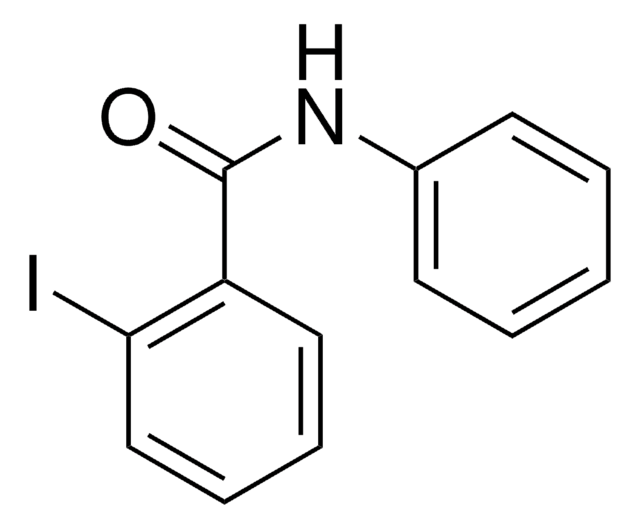75974
Tepraloxydim
certified reference material, TraceCERT®, Manufactured by: Sigma-Aldrich Production GmbH, Switzerland
Sinónimos:
trans-2-[1-(3-Chloroallyloxyimino)propyl]-3-hydroxy-5-(tetrahydro-2H-pyran-4-yl)-2-cyclohexen-1-one
About This Item
Productos recomendados
grade
certified reference material
TraceCERT®
Quality Level
product line
TraceCERT®
shelf life
limited shelf life, expiry date on the label
manufacturer/tradename
Manufactured by: Sigma-Aldrich Production GmbH, Switzerland
format
neat
storage temp.
−20°C
SMILES string
CC\C(=N/OC\C=C\Cl)C1=C(O)CC(CC1=O)C2CCOCC2
InChI
1S/C17H24ClNO4/c1-2-14(19-23-7-3-6-18)17-15(20)10-13(11-16(17)21)12-4-8-22-9-5-12/h3,6,12-13,20H,2,4-5,7-11H2,1H3/b6-3+,19-14+
InChI key
IOYNQIMAUDJVEI-BMVIKAAMSA-N
¿Está buscando productos similares? Visita Guía de comparación de productos
General description
Certified content by quantitative NMR incl. uncertainty and expiry date are given on the certificate.
Download your certificate at: http://www.sigma-aldrich.com
Tepraloxydim is a selective and systemic cyclohexanedione oxime herbicide. It is an acetyl CoA carboxylase (ACCase) inhibitor preventing the incorporation of acetate into fatty acids and blocking the production of phospholipids used in building new membranes. Tepraloxydim is used for post-emergence control of grass weeds, especially Poa annua, volunteer maize, Sorghum halepense, and Elymus repens, in broad-leaved crops, at 50–100 g/ha.
According to the Commission Implementing Regulation (EU) No 2022/801 of 20th May 2022, tepraloxydim is not approved for use as a plant protection agent in the European Union (EU), following the Regulation (EC) No. 1107/2009. But maximum residue levels of 0.1 mg/kg are allowed for the presence of tepraloxydim, measured as the sum of tepraloxydim and its metabolites that can be hydrolyzed either to the moiety 3-(tetrahydro-pyran-4-yl)-glutaric acid or to the moiety 3-hydroxy-(tetrahydro-pyran-4-yl)-glutaric acid, in products of plant and animal origin, according to the EU Reg. No 2019/91.
Tepraloxydim has to be monitored in the Multiannual Control Programme for Pesticides Residues (MACP), run within the EU and EFTA in/on products of plant origin.
Application
Tepraloxydim CRM may also be used as given below:
- Screening and quantification of 569 pesticides in honeysuckle samples by a combination of ultrahigh-performance liquid chromatography (UHPLC) and quadrupole-Orbitrap high-resolution mass spectrometry
- Detection of 252 pesticides extracted from surface water samples by solid-phase extraction (SPE) using liquid chromatography quadrupole-orbitrap high-resolution tandem mass spectrometry
- Evaluation of 250 pesticide residues extracted by QuEChERS method from 103 processed fruit samples using ultra-high performance liquid chromatography-tandem mass spectrometry (UHPLC-MS/MS)
- Development of a method for simultaneous quantification of 200 pesticide residues in lettuce and orange samples based on methanol as the extraction solvent, ultra-high-performance liquid chromatography (UHPLC) for separation, and tandem mass spectrometry (MS/MS) for detection
- Residue analysis of 261 pesticides, their metabolites, and polychlorinated biphenyls using modified QuEChERS protocol― optimized for extremely low molecular weight samples and liquid/gas chromatography coupled with tandem mass spectrometry
- To develop and validate a method for the quantitative analysis of 207 pesticide residues in honey samples using both LC-MS/MS and GC-MS/MS compounds
Legal Information
signalword
Warning
hcodes
Hazard Classifications
Carc. 2 - Repr. 2
Storage Class
11 - Combustible Solids
wgk_germany
WGK 3
flash_point_f
Not applicable
flash_point_c
Not applicable
Elija entre una de las versiones más recientes:
Certificados de análisis (COA)
¿No ve la versión correcta?
Si necesita una versión concreta, puede buscar un certificado específico por el número de lote.
¿Ya tiene este producto?
Encuentre la documentación para los productos que ha comprado recientemente en la Biblioteca de documentos.
Nuestro equipo de científicos tiene experiencia en todas las áreas de investigación: Ciencias de la vida, Ciencia de los materiales, Síntesis química, Cromatografía, Analítica y muchas otras.
Póngase en contacto con el Servicio técnico









